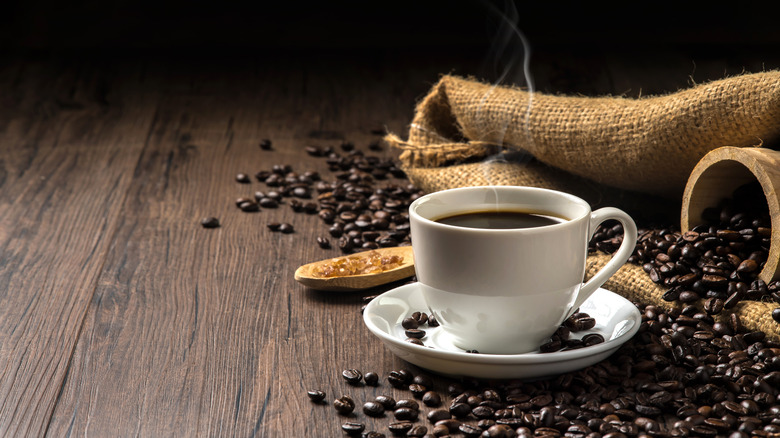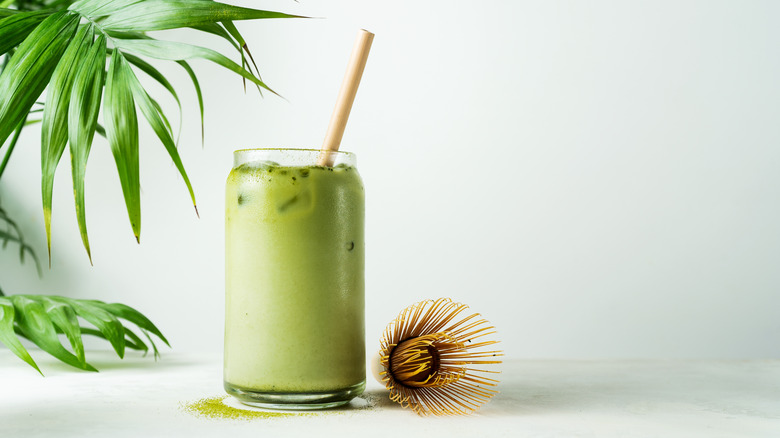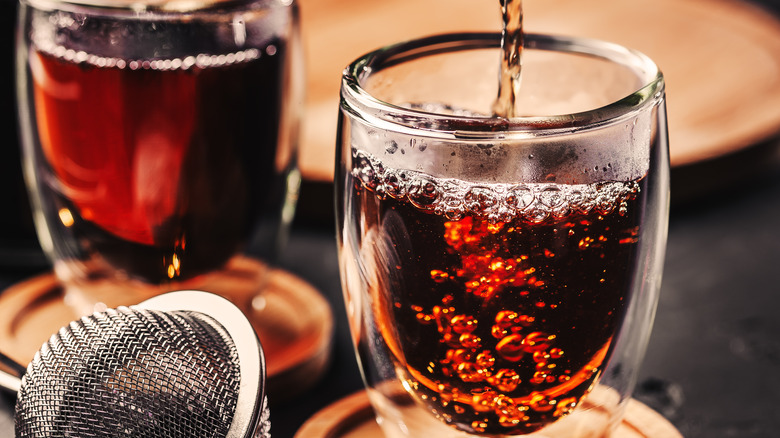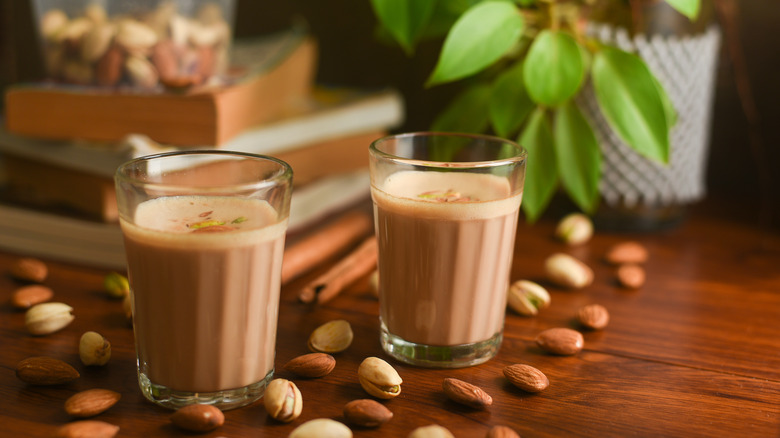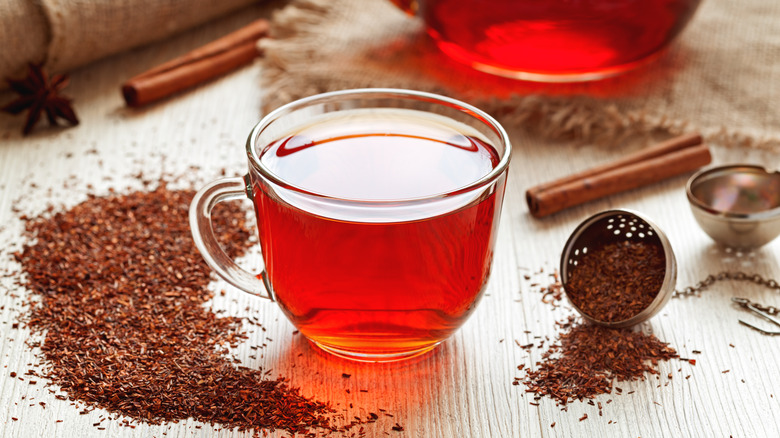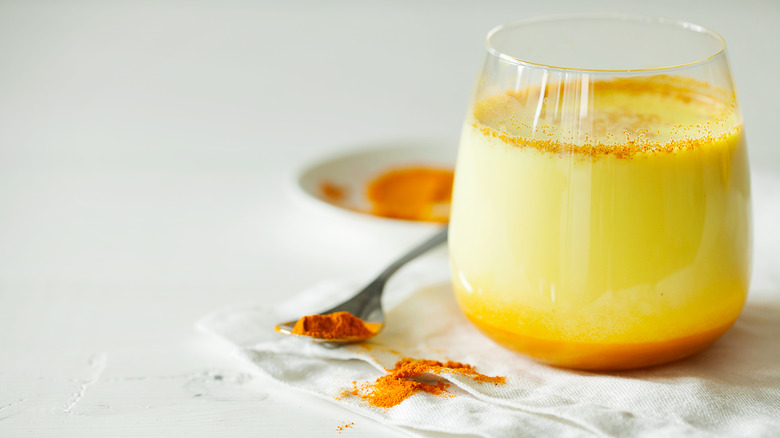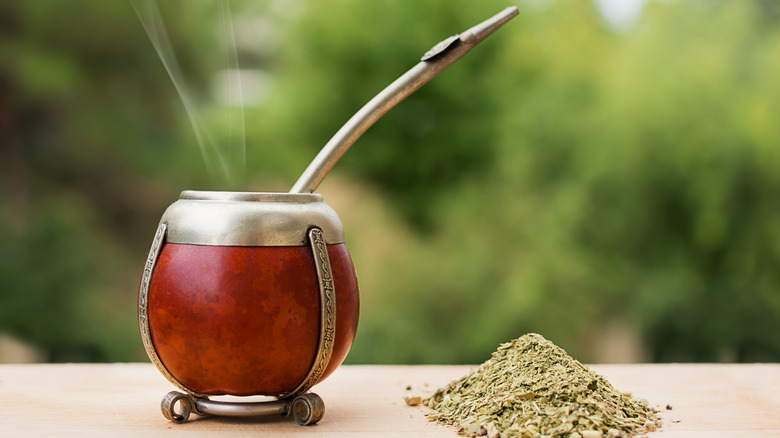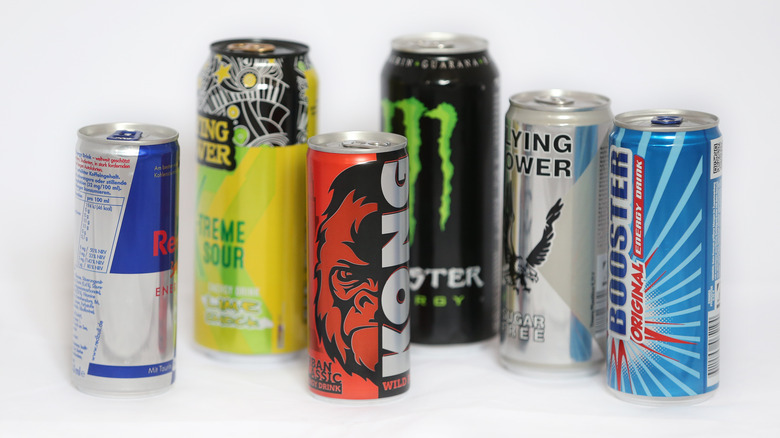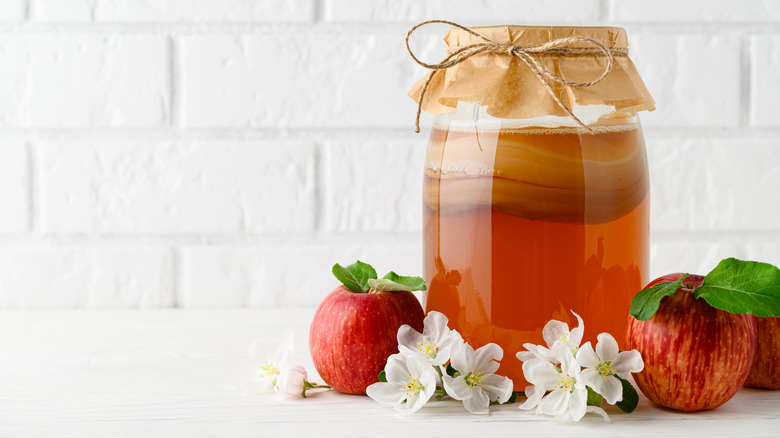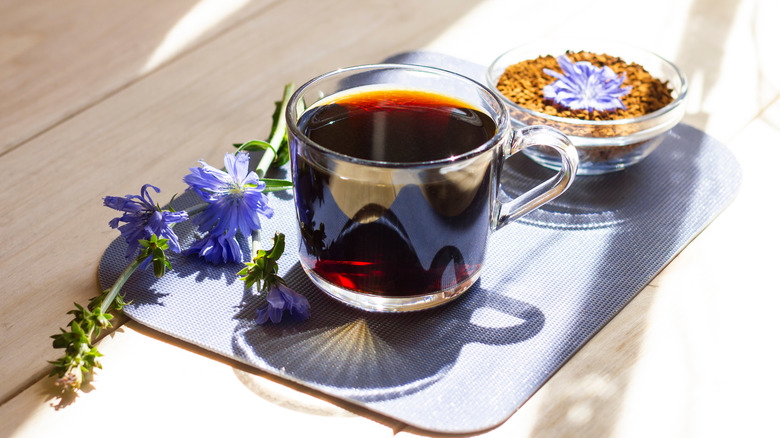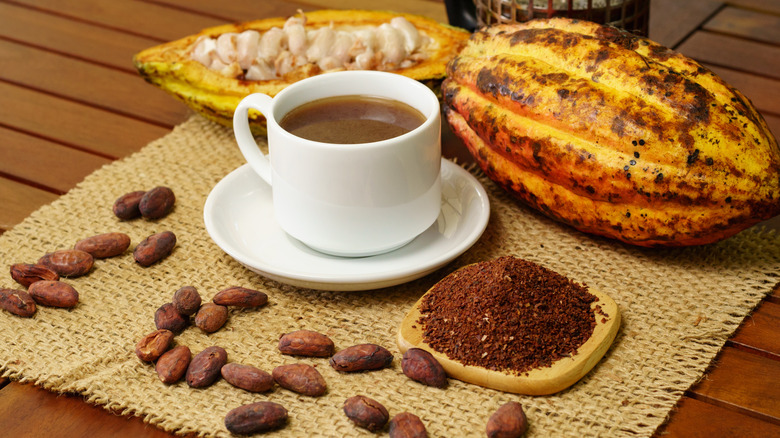10 Best Substitutes For Coffee
Many of us start our days off with a cup of coffee, whether that's in the form of regular drip coffee, espresso, a hot latte, or cold brew. But needing a daily dose can sometimes be expensive, not to mention that all that caffeine can go to your head — literally. According to Healthline, the effects of the excess caffeine in coffee and espresso drinks can mimic symptoms of anxiety, including nervousness, trouble sleeping, and a fast heart rate.
As Mayo Clinic also notes, an average serving of brewed coffee has 96 milligrams of caffeine, which is about a quarter of the recommended "safe" amount per day of 400 milligrams. However, if you have two, three, or even four cups of coffee throughout the day — and not all of them are your typical eight ounces of unsweetened, medium roast Keurig cups — that can add up quick. Not to mention diet sodas, iced tea, and other drinks will tack onto this daily dosage.
So, if you're trying to give up Starbucks for a month, or you want to try some other perk ups besides coffee, here are 10 other great alternatives.
1. Matcha
Matcha has been skyrocketing in popularity in recent years. Maybe you've overheard someone in front of you at the café ask the barista for an iced matcha latte, but do you know what exactly is in it? Matcha is essentially ground green tea leaves and has around 70 milligrams of caffeine per cup, according to Tea Forte.
Though that number may not be that far off from the amount of caffeine in coffee, it is processed differently by the body. Because matcha is made from tea leaves, the caffeine is absorbed slower, so you won't get the "crash" and that sudden drowsy feeling many people get from consuming coffee, says The Volante. Another great thing about matcha is that it is usually available to order where you would get your coffee, so you can still make those Starbucks or Dunkin' runs and get this drink option there, too.
According to One Green Planet, matcha is also available in the form of teas, frappuccinos, and shakes, so there's bound to be a version out there that you'll enjoy. However it's good to note that, alone, matcha can be very bitter in taste, so it's usually sweetened with honey or agave, according to Baking Kneads.
2. Black Tea
If you're looking for something else that still has a substantial caffeine content and is widely available in most cafés, look no further than a classic black tea. Like matcha, it can be prepared in a variety of different ways — both hot and cold. According to Sweet Steep, some popular Starbucks menu items that use black tea include an iced tea, the London Fog Tea Latte, and the Teavana Mango Black Tea.
According to Healthline, a cup of black tea usually has at least 47 milligrams of caffeine, but can have as much as 90 milligrams, which is around the same as a cup of coffee. Its flavor is a lot sharper, but also versatile when combined with other liquids like milk or lemonade. Black tea is enjoyed in a variety of different cultures, like during "high tea" in the United Kingdom and as the base of bubble tea in Taiwan.
If you're just looking to begin working black tea into your morning routine in place of coffee, try steeping some black tea bags and adding a dash of milk for a simple, yet delicious brew.
3. Chai
Chai is technically a type of black tea, but there is so much more to this tea blend, including a range of spices that provide a unique flavor. Traditional masala chai, with the trademark masala spices, originated in India and is typically sweetened with jaggery, a type of unrefined cane sugar, according to cook click n devour. After gaining worldwide popularity, many different versions of chai began to evolve. Unfortunately, it's harder to find the "real deal" in the United States, with most chai drinks being made out of a syrup concentrate instead of from scratch. That being said, it is another common drink on many coffeehouse menus and usually contains around 47 milligrams of caffeine, according to Coffee Affection.
Chai can be enjoyed hot or cold and comes in a multitude of different concoctions including the ever popular chai latte that includes steamed milk. A dirty chai is a great option for coffee lovers that might miss the taste of fresh coffee, but also want to explore a different caffeinated drink. A dirty chai mixes one to two shots of espresso in a chai latte, combining the distinct flavor with extra caffeine.
4. Rooibos Tea
Classified as an herbal tea — or one that has no caffeine content — rooibos may come as a surprise as a great substitute for coffee. But with its rich flavor and dark color, it almost looks and tastes like it could be a mild roast and is often prepared like a black tea. This makes it the perfect choice for those that want the feel of coffee but don't want the jitters, including pregnant women and children. Additionally, according to Healthline, another benefit is that it is full of powerful antioxidants that are beneficial for the heart.
However, if you are seeking a drink that will give you a caffeine fix, you might want to turn to another alternative.
Obtaining and brewing rooibos tea is relatively simple: EnjoyingTea.com states that you just steep the leaves in a teapot, adding optional milk or honey if desired. Although rooibos tea is often consumed hot, you can also make an iced version if you want to mimic your normal morning cold brew. Simple Loose Leaf suggests a variety of ways you can mix up your rooibos tea that allow plenty of opportunities for experimentation.
5. Golden Milk/Turmeric Latte
More people are starting to pick up on the amazing anti-inflammatory benefits of turmeric, including popularizing a turmeric latte known as golden milk. But, haldi doodh, as it's traditionally called, has been around for years and originated in India as therapeutic ailment to colds, aches, and restlessness, according to Sukhi Singh.
As noted on her website, to make this rich and comforting drink, you only need milk, turmeric powder, honey, and cardamom — and it can be made in hot and cold varieties. With its creaminess and warm texture, it is very similar to many coffeeshop creations and can even distract the most devoted coffee drinkers' minds from missing a daily cappuccino.
Golden milk is becoming widely available in coffeehouses, supermarkets, and even niche juice stores, so there's plenty of opportunities to give it a try. And since it was made not just for the taste, but also for soothing the mind, enjoying this drink can be a great way to delight in a hot beverage while calming the senses.
6. Yerba Mate
Yerba Mate has become a popular drink in recent years — it's a type of tea that comes from the leaves of a holly tree, called Ilex paraguariensis, that's located in the South American Atlantic rainforest, according to Guayakí. And it has a good amount of naturally-derived caffeine. There's 80 milligrams per cup, which is about double the amount of black tea and nearing a cup of coffee, according to LA Times. So it's a great choice if you are looking for a substitute for coffee that will still give you the energy boost you need.
The types of Yerba Mate usually seen in stores are sold in cans, but it can also come as loose leaves and in bottles as well. Furthermore, because of its canned and bottled appearances, some people might think that Yerba Mate is a sugary drink, but it's actually slightly bitter, especially if made from younger leaves (via Aviva Yerba Mate). Yerba Mate is also said to has an acquired taste, described as very earthy and pungent, according to Delishably.
7. Energy Drinks
Most people are familiar with energy drinks, whether it's an OG like Red Bull or one of the newer, sportier ones like Celsius or Alani Nu. Energy drinks, like coffee, are often used to provide energy — but in this case, they are also often used for a performance boost before a workout or big game. That's because they can contain a ton of caffeine. According to Proper Wild, an energy drink can contain up to 350 milligrams in one can!
So while this substitute for coffee can definitely deliver a caffeine kick, it's cautioned not to consume too many energy drinks at once as just a couple can set you way over the suggested daily limits for caffeine intake. In fact, according to University of Michigan Health, there is evidence that energy drinks can lead to higher blood pressure and increased blood sugar, especially in children, teenagers, and diabetics.
But when consumed in moderation, energy drinks can be a great pick. They are very accessible and usually affordable and have a range of flavors too. Mashed even offers a ranked list of our favorites if you need help deciding.
8. Kombucha
There are few drinks that have become as much of a phenomenon as kombucha has become in recent years. This fermented tea drink is made out of yeast and sugar, which produces a fizzy and slightly sour beverage that's full of gut-happy probiotics, according to WebMD. Kombucha comes in a variety of different flavors, and with its rising popularity, there are now many brands on the market and it's sold everywhere from Amazon to Publix. You can even make it from home if you have the right starter.
Kombucha has also become a rave-worthy substitute for coffee since it also has caffeine, with the added bonus of antioxidants and probiotics. According to Healthline, because it's made from a base of tea, caffeine will naturally be present but fermentation cuts down on the amount that remains — so one cup of kombucha made from green tea, for example, is estimated to have about 10 milligrams. That makes it great for getting a little boost of energy without going overboard.
9. Chicory Coffee
What is chicory coffee, and how is it different from regular coffee? According to Healthline, chicory coffee has a very similar taste to regular brew, except it's made from chicory roots, giving it a more nutty and earthy flavor — and because it's not roasted from beans, it has no caffeine. So it's a great option if you love the taste of coffee but not the jitters. The other benefits are it's high in fiber and is thought to improve digestive health.
Chicory coffee is especially popular in New Orleans, where it's often combined with regular drip brew to create "New Orleans style coffee." Café Du Monde is a popular New Orleans spot that sells chicory coffee both in-person at its cafés or in cans that can be ordered online. It's paired with beignets so pick up some of those too while you're at it!
Chicory coffee still has its niche audience, so it might be harder to find outside of places like the French Quarter. However, you may be able to find this substitute that can help you curb your caffeine consumption in select health food stores or online. When you do manage to get your hands on this rich, tasty coffee alternative, you won't be disappointed.
10. Brewed Cacao
If mochas are your go-to coffee drink, consider trying a mug of brewed cacao instead. This hearty drink is exactly what it sounds like: ground cacao beans that are put into a French press, then steeped for optimal flavor. The result is low in caffeine, but contains theobromine, a central nervous system stimulant that can boost energy in a similar way to coffee (via Food & Nutrition).
Many are also cozying up to the drink because of its optimal taste — we all know how good hot chocolate is, after all. Unlike that drink, though, brewed cacao is low in sugar, as it is made from cacao nibs, a superfood that's known for being high in antioxidants and can even be a source of protein, says Healthliine. Cacao nibs are derived from cocoa beans, but are fermented and sometimes roasted, giving them the chocolatey flavor that many of us know and love.
Try brewed cacao as a cold brew, too, which can be perfect to sip on in warmer months, says TCHO.
